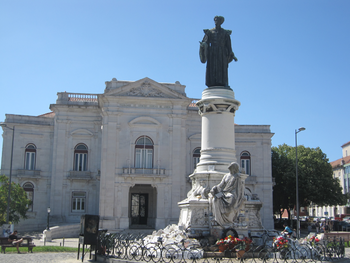Philosophy:Secular saint
The term secular saint has no strict definition, but generally refers to someone venerated and respected for contributions to a noble cause, but not recognized as a canonical saint by any particular religion. The ranks of secular saints, like those of religious ones, are often filled by martyrs.
George Orwell began his "Reflections on Gandhi": "Saints should always be judged guilty until they are proved innocent…" Orwell concluded his essay with an attack on the idea of sainthood but praise for Gandhi:
One may feel, as I do, a sort of aesthetic distaste for Gandhi, one may reject the claims of sainthood made on his behalf (he never made any such claim himself, by the way), one may also reject sainthood as an ideal and therefore feel that Gandhi's basic aims were anti-human and reactionary: but regarded simply as a politician, and compared with the other leading political figures of our time, how clean a smell he has managed to leave behind! [1]
The term has also been applied to the incel community, which has been observed referring to mass-killer Elliot Rodger as "Saint Elliot" within the online spaces and discourses of the community and celebrating the anniversary of the 2014 Isla Vista killings as "Saint Elliot Day". Some academics, such as Taisto Witt, have suggested that, while the incel community is apparently nonreligious, their treatment of Rodger suggests that he has been appointed to a position that functionally operates as that of a saint within the community.[2] Thelema is a philosophical movement with a list of saints including individuals such as Roger Bacon.[3]
See also
- Beatification
- Canonization
- Hagiography
- Saint
- Folk saint
- Phallic saint
- Military saint
Notes
- ↑ "Reflections on Gandhi". Partisan Review, Volume XVI, No. 1, January 1949 p 85 - 92.
- ↑ ‘If i cannot have it, i will do everything i can to destroy it.' the canonization of Elliot Rodger: ‘Incel’ masculinities, secular sainthood, and justifications of ideological violence, Witt, T. (2020) Social Identities
- ↑ Kaczynski, R. (2010). Perdurabo, Revised and Expanded Edition: The Life of Aleister Crowley. North Atlantic Books. p. 265. ISBN 978-1-55643-899-8. https://books.google.com/books?id=HlEvfflQZbIC&pg=PA265. Retrieved 2023-06-02.
References and further reading
- "The Path of Brighteousness" by Cullen Murphy for The Atlantic (November 2003)
- Witt, T. (30 June 2020). "‘If i cannot have it, i will do everything i can to destroy it.' the canonization of Elliot Rodger: ‘Incel’ masculinities, secular sainthood, and justifications of ideological violence". Social Identities 26 (5): 675–689. doi:10.1080/13504630.2020.1787132.
 |


